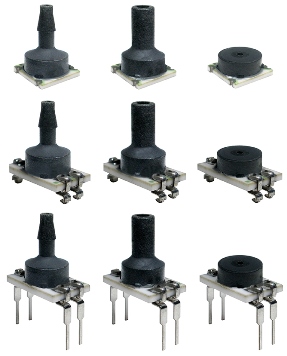Honeywell today announced its new Basic Board Mount Pressure Sensors, Compensated, Unamplified, TBP Series.
These new sensors are designed for customers who require a simple, high quality, cost-effective, basic performance, mV output sensor that is compensated and unamplified so they can do their own amplification while retaining maximum resolution.
“The new TBP Series are designed to be flexible to meet the varying needs of our customers,” said Jacqueline Leff, senior product marketing manager. “Their small size and numerous package options simplify placement on crowded PC boards, a wide pressure range allows for use in applications requiring higher pressures, and their low current consumption allows for use in battery applications. Additionally, customers can count on a fast response for quotes and samples, and a supply chain that is available throughout their development cycle.”
 TBP Series of Basic Pressure Switches.
TBP Series of Basic Pressure Switches.
The TBP Series, used to measure gauge pressures, may potentially be used in medical applications including hospital beds, oxygen concentrators, wound therapy and blood pressure monitoring, and industrial applications such as HVAC transmitters, air movement control, environmental control, leak detection, pneumatic controls and other commercial applications.
Gauge pressure sensors are referenced to atmospheric pressure and provide an output proportional to pressure variations from atmosphere. They are intended for use with non-corrosive, non-ionic gases, such as air and other dry gases, and for non-corrosive, non-ionic liquids when the silicone gel coating option is selected. The TBP Series are designed and manufactured according to ISO 9001 and are ROHS compliant.
The TBP Series Basic Board Mount Pressure Sensors offer a wide pressure range (1 psi to 150 psi, 60 mbar to 10 bar, 6 kPa to 1 MPa) and an operating temperature range from -40°C to 125°C (-40°F to 257°F) and a 0°C to 85°C compensated temperature range. Their size of 7 mm x 7 mm (0.276 in x 0.276 in) is very small when compared to most board mount pressure sensors, simplifying installation. The TBP Series have an unlimited shelf life after the packaging is opened, can be calibrated within one hour after reflow solder, and are compatible with modern lead-free, no-clean solder processes.
About Honeywell
Honeywell is a Fortune 100 diversified technology and manufacturing leader, serving customers worldwide with aerospace products and services; control technologies for buildings, homes and industry; turbochargers; and performance materials. Based in Morris Township, N.J., Honeywell’s shares are traded on the New York, London, and Chicago Stock Exchanges.
Honeywell Sensing and Control is a leading global supplier of custom-engineered sensors, switches, machine safeguarding and other devices that offer enhanced precision, repeatability and durability to a variety of original equipment manufacturing applications across the medical, industrial, transportation, aerospace, and test and measurement segments.
This release contains certain statements that may be deemed "forward-looking statements" within the meaning of Section 21E of the Securities Exchange Act of 1934. All statements, other than statements of historical fact, that address activities, events or developments that we or our management intends, expects, projects, believes or anticipates will or may occur in the future are forward-looking statements. Such statements are based upon certain assumptions and assessments made by our management in light of their experience and their perception of historical trends, current economic and industry conditions, expected future developments and other factors they believe to be appropriate.
The forward-looking statements included in this release are also subject to a number of material risks and uncertainties, including but not limited to economic, competitive, governmental, and technological factors affecting our operations, markets, products, services and prices. Such forward-looking statements are not guarantees of future performance, and actual results, developments and business decisions may differ from those envisaged by such forward-looking statements. We identify the principal risks and uncertainties that affect our performance in our Form 10-K and other filings with the Securities and Exchange Commission.